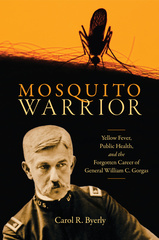
304 pages, 6 1/8 x 9 1/4
11 B&W figures - 2 maps - 3 tables
Paperback
Release Date:06 Oct 2020
ISBN:9780817356927
Enemy in the Blood
Malaria, Environment, and Development in Argentina
University of Alabama Press
Enemy in the Blood: Malaria, Environment, and Development in Argentina examines the dramatic yet mostly forgotten history of malaria control in northwest Argentina. Carter traces the evolution of malaria science and policy in Argentina from the disease’s emergence as a social problem in the 1890s to its effective eradication by 1950. Malaria-control proponents saw the campaign as part of a larger project of constructing a modern identity for Argentina. Insofar as development meant building a more productive, rational, and hygienic society, the perceptions of a culturally backwards and disease-ridden interior prevented Argentina from joining the ranks of “modern” nations. The path to eradication, however, was not easy due to complicated public health politics, inappropriate application of foreign malaria control strategies, and a habitual misreading of the distinctive ecology of malaria in the northwest, especially the unique characteristics of the local mosquito vector. Homegrown scientific expertise, a populist public health agenda, and an infusion of new technologies eventually brought a rapid end to malaria’s scourge, if not the cure for regional underdevelopment.
Enemy in the Blood sheds light on the often neglected history of northwest Argentina’s interior, adds to critical perspectives on the history of development and public health in modern Latin America, and demonstrates the merits of integrative socialenvironmental research.
Enemy in the Blood sheds light on the often neglected history of northwest Argentina’s interior, adds to critical perspectives on the history of development and public health in modern Latin America, and demonstrates the merits of integrative socialenvironmental research.
‘This is a much needed volume that attends to the sociopolitical dimensions of infectious disease. Carter brings together historical documents with a place-based analysis to inform the production of malaria eradication campaigns in Argentina in a way that offers much to the social sciences.’
—AAG Review of Books
‘...the impressively well researched and referenced work has much to offer students of social, ecological, and medical history.’
—Lancet
‘Deeply researched and thoughtfully argued, Enemy in the Blood represents an important contribution to the history of malaria.’
—Journal of the History of Medicine
Enemy in the Blood is exhaustively researched, well written, and provides detail about a compellingly important issue for Argentina as well as other poor countries. The book will be of great interest to scholars not just in Latin American social history but also in the history of medicine, geography, and public health.’
—Latin Americanist
‘Carter does a nice job of satisfying those who demand ‘theorization’ without allowing cultural analysis–speak to overwhelm and obscure his narrative. The story is clearly and convincingly told, and the primary source usage is impressive.’
—Margaret Humphreys, author of Intensely Human: The Health of the Black Soldier in the American Civil War and Malaria: Poverty, Race, and Public Health in the United States
‘Eric Carter's Enemy in the Blood makes an original, rigorous, and significant contribution to understanding the intertwined social/natural, conceptual/material processes involved in the role of epidemic diseases in the emergence of place. This book will be of great interest to historians, geographers, anthropologists, rural sociologists and, one hopes, epidemiologists.’
—Andrew Sluyter, author of Colonialism and Landscape: Postcolonial Theory and Applications
‘A key element of the Argentine malaria campaign was to link the disease with place. Effective control strategies incorporated the geographical context. In a similar vein, Carter makes a convincing case that the history of medicine also benefits from close attention to the role of place. Deeply researched and thoughtfully argued, Enemy in the Blood represents an important contribution to the history of malaria.’
—Frederick R. Davis, Journal of the History of Medicine and Allied Sciences
Eric D. Carter is Edens Associate Professor of Geography and Global Health at Macalester College.
List of Illustrations ix
Acknowledgments xi
Introduction: A Sickness in the Land 1
1. A Cure for Backwardness? The Rationale for Malaria Control 17
2. Launching the Campaign 49
3. Foreign, National, and Local Influences on Malaria Control 75
4. “Think like a Mosquito”: Turning the Tide against Malaria 107
5. “God Bless General Perón”: The Politics and
Technologies of Malaria Eradication 141
Conclusion: Malaria, Geography, and Lessons for Today 167
Epilogue 174
Notes 181
Glossary 241
Note on Sources 245
Bibliography 249
Index 273










